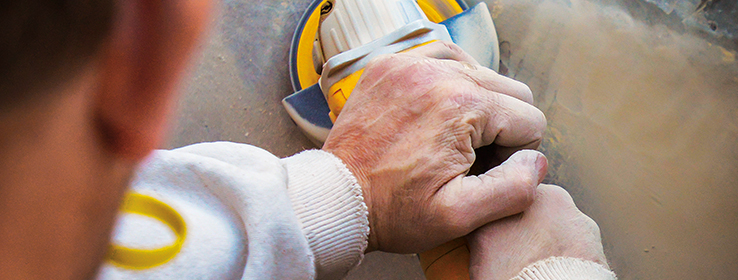Contractors who know when and how to build mockups have a powerful tool for increasing sales and customer satisfaction.
They say one picture is worth a thousand words, but sometimes even a picture doesn’t convey enough information. For concrete coating projects, it often takes a full-scale, three-dimensional representation to really show how the finished job will look and ensure that customers will be satisfied. Creating such mockups allows a contractor to sell more effectively and set realistic customer expectations.
Mockups for verification
If you’re a contractor interested in assistance with mockups, get in touch with your Sherwin-Williams representative or the manager of your local store. They can go out to the job site, look at the existing conditions, and see what kind of surface problems you may have to address when doing the job.
A mockup is often a required part of the contract, especially on new commercial projects where particular products have been specified by an architect or engineer. Mockups may include systems for either flat decorative projects or projects needing protective coatings, or be subject to inspection and approval by the specifier, the owner and the general contractor. In those cases, the product selection, including the color and texture, has already been made. The mockup serves only to verify that the product meets expectations before it’s delivered and put in place.
Mockups as a selling tool
In other cases, mockups help customers visualize a decorative or protective coating and decide which products will best suit their needs. Brian Mills, a Sherwin-Williams sales representative for H&C Decorative Concrete Products, says that mockups can help demonstrate the different possibilities. “In the aftermarket, we often need to work with a homeowners’ association or a church building committee. I like to show multiple options in one mockup, because it’s more efficient and less expensive than doing several different ones. We can show a texture they like with three different stains. The mockup gives them a visual they can all agree on, and narrowing the range of options helps the customers choose,” Mills says.
Managing expectations
Another function of on-site mockups is to clarify the expectations of all parties involved. The property owner gets to see how the product looks in their own space, under real lighting conditions. They can actually feel the texture and tell whether it provides enough comfort or slip-resistance underfoot. Some contractors will apply test patches of coatings with different gloss levels, so customers can choose the one they like best.
Just as important, the contractor gets to see the condition of the existing substrate and determine how much and what kind of surface preparation will be required. In projects where the concrete substrate has undergone repair work, it’s helpful for everyone to see how well a proposed coating will conceal patched areas and whether an alternative texture or color might work better.
Covering costs
Mockups are a valuable tool, but they do take time and cost money, so contractors should be sure to have those costs covered. Some contractors include a separate line item for a mockup in their bids, and sometimes offer to deduct a percentage of that item if they’re awarded the job. Others build the mockup cost into their bid price and don’t call it out separately. And some take advantage of other sources of support instead of or in addition to these methods.




